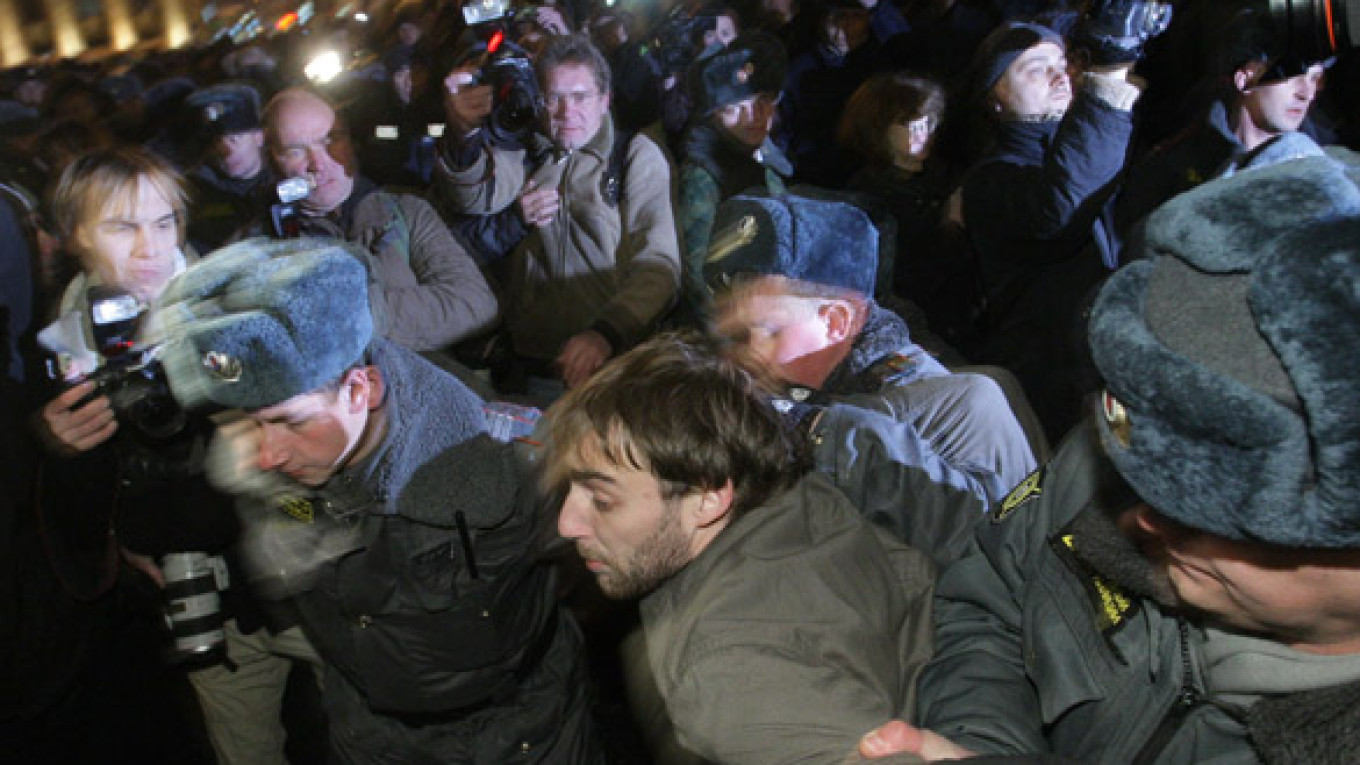GENEVA — Russia fails to protect journalists, activists, prison inmates and others at odds with authorities from a wide range of abuses, including torture and murder, the UN Human Rights Committee said Friday.
The findings came in a report by an 18-member panel of independent experts who urged the Kremlin to implement a number of legal reforms. They include narrowing the broad definitions of terrorism and extremism under Russian law, decriminalizing defamation cases against journalists and granting appeal rights to people forced into psychiatric hospitals by the courts.
The report held Russia responsible for reported attacks on civilians by armed groups in South Ossetia in the aftermath of the August 2008 war with Georgia, saying Russia should have moved to stop them, and called for Moscow to investigate those abuses.
It also said journalists were subject to politically motivated trials and convictions, discouraging critical media reporting, and urged the government to take action against what the panel called an increasing number of hate crimes and racially motivated attacks.
Dmitry Peskov, spokesman for Prime Minister Vladimir Putin, said he had not seen the report and could not comment.
The harshest criticism, perhaps, was reserved for the justice system in Chechnya and other parts of the North Caucasus. The panel cited reports of torture, forced disappearance, arbitrary arrest and extrajudicial killing in those regions committed by the military and security services, saying the perpetrators “appear to enjoy widespread impunity” from punishment for their actions.
The Human Rights Committee gave Moscow one year to report back on how it was investigating abuses in the North Caucasus and South Ossetia, and protecting journalists and activists throughout Russia. The panel has no enforcement power, but it issues regular reports to draw public attention to human rights violations around the world.
While the report did not cite specific cases or statistics, it alluded to the killings of a number of journalists and human rights activists in Russia that remain unresolved, including the 2006 shooting of Anna Politkovskaya. The internationally known journalist was a harsh critic of the Kremlin and exposed widespread human rights abuses and corruption in Chechnya.
Prosecutors have said little about who might have ordered Politkovskaya’s contract-style slaying on Oct. 7, 2006. The suspected gunman is believed to be hiding abroad.
Two Western journalist groups on Thursday sent a letter to President Dmitry Medvedev demanding that those responsible for the death of Natalya Estemirova, a Chechen human rights activist, be brought to justice.
Estemirova, who wrote occasionally for Politkovskaya’s newspaper, Novaya Gazeta, was kidnapped in front of her apartment building by four men in broad daylight in July. Her body was later found riddled with bullets along an Ingush road. There have been no arrests in the case.
“Through her professional work, Estemirova had accumulated a damning body of evidence linking human rights crimes to Chechen authorities, particularly the militia of local President Ramzan Kadyrov,” said the joint statement by the Committee to Protect Journalists and the PEN American Center.
The statement said Estemirova was the 18th journalist murdered in Russia “in direct retaliation for her work” since 2000, and that in each case those who ordered the killings have escaped conviction.
The committee said it was concerned at “the alarming incidence of threats, violent assaults and murders of journalists and human rights defenders in the state party, which has created a climate of fear and a chilling effect on the media.”
The slayings of Estemirova, rights lawyer Stanislav Markelov and others in just the past year have not stopped human rights activists from working in Russia or the Caucasus. But the killings have made many of those working to halt alleged abuses by the authorities — including kidnappings, torture and extrajudicial killings — extremely cautious, with some avoiding media exposure.
The expert panel said it also was concerned about violence against lesbian, gay and bisexual persons, including reports of police harassment. It said it received reports of people being assaulted or even killed because they were gay or lesbian. The panel said it was concerned about the “systematic discrimination against individuals on the basis of their sexual orientation” in Russia.
The United Nations panel — which last week assessed the compliance of Russia and four other countries with the UN’s 1966 international treaty on civil and political rights — receives its information from various UN agencies, nongovernmental organizations and cases at the European Court of Human Rights.
A Message from The Moscow Times:
Dear readers,
We are facing unprecedented challenges. Russia's Prosecutor General's Office has designated The Moscow Times as an "undesirable" organization, criminalizing our work and putting our staff at risk of prosecution. This follows our earlier unjust labeling as a "foreign agent."
These actions are direct attempts to silence independent journalism in Russia. The authorities claim our work "discredits the decisions of the Russian leadership." We see things differently: we strive to provide accurate, unbiased reporting on Russia.
We, the journalists of The Moscow Times, refuse to be silenced. But to continue our work, we need your help.
Your support, no matter how small, makes a world of difference. If you can, please support us monthly starting from just $2. It's quick to set up, and every contribution makes a significant impact.
By supporting The Moscow Times, you're defending open, independent journalism in the face of repression. Thank you for standing with us.
Remind me later.


